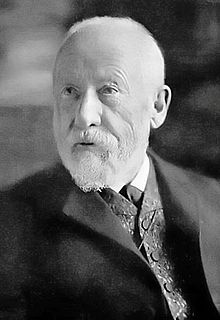
Existence is the ontological property of being, with reference to the ability of an entity to, directly or indirectly, interact with the physical or, especially in idealistic worldviews, mental reality.
In philosophy, Idealism is the group of metaphysical philosophies that assert that reality, or reality as humans can know it, is fundamentally mental, mentally constructed, or otherwise immaterial. Epistemologically, Idealism manifests as a skepticism about the possibility of knowing any mind-independent thing. In contrast to Materialism, Idealism asserts the primacy of consciousness as the origin and prerequisite of material phenomena. According to this view, consciousness exists before and is the pre-condition of material existence. Consciousness creates and determines the material and not vice versa. Idealism believes consciousness and mind to be the origin of the material world and aims to explain the existing world according to these principles.

Metaphysics is the branch of philosophy that examines the fundamental nature of reality, including the relationship between mind and matter, between substance and attribute, and between possibility and actuality. The word "metaphysics" comes from two Greek words that, together, literally mean "after or behind or among [the study of] the natural". It has been suggested that the term might have been coined by a first century CE editor who assembled various small selections of Aristotle’s works into the treatise we now know by the name Metaphysics.
The noosphere is the sphere of human thought. The word derives from the Greek νοῦς and σφαῖρα, in lexical analogy to "atmosphere" and "biosphere". It was introduced by Pierre Teilhard de Chardin in 1922 in his Cosmogenesis. Another possibility is the first use of the term by Édouard Le Roy (1870–1954), who together with Teilhard was listening to lectures of Vladimir Ivanovich Vernadsky at the Sorbonne. In 1936, Vernadsky accepted the idea of the noosphere in a letter to Boris Leonidovich Lichkov (though he states that the concept derives from Le Roy. Citing the work of Teilhard's biographer—Rene Cuenot—Sampson and Pitt stated that although the concept was jointly developed by all three men, Teilhard believed that he actually invented the word: "I believe, so far as one can ever tell, that the word 'noosphere' was my invention: but it was he [Le Roy] who launched it."

Charles Hartshorne was an American philosopher who concentrated primarily on the philosophy of religion and metaphysics, but also contributed to ornithology. He developed the neoclassical idea of God and produced a modal proof of the existence of God that was a development of St. Anselm's ontological argument. Hartshorne is also noted for developing Alfred North Whitehead's process philosophy into process theology.
Emergent evolution was the hypothesis that, in the course of evolution, some entirely new properties, such as mind and consciousness, appear at certain critical points, usually because of an unpredictable rearrangement of the already existing entities. The term was originated by the psychologist C. Lloyd Morgan in 1927.
Process and Reality is a book by Alfred North Whitehead, in which Whitehead propounds a philosophy of organism, also called process philosophy. The book, published in 1929, is a revision of the Gifford Lectures he gave in 1927–28.
We diverge from Descartes by holding that what he has described as primary attributes of physical bodies, are really the forms of internal relationships between actual occasions. Such a change of thought is the shift from materialism to Organic Realism, as a basic idea of physical science.
The Muirhead Library of Philosophy was an influential series which published some of the best writings of twentieth century philosophy. The original programme was drawn up by John Muirhead and published in Erdmann's History of Philosophy in 1890. This statement was published in slightly altered form in subsequent volumes:
French philosophy, here taken to mean philosophy in the French language, has been extremely diverse and has influenced Western philosophy as a whole for centuries, from the medieval scholasticism of Peter Abelard, through the founding of modern philosophy by René Descartes, to 20th century philosophy of science, existentialism, phenomenology, structuralism, and postmodernism.

Nikolay Onufriyevich Lossky, also known as N. O. Lossky, was a Russian philosopher, representative of Russian idealism, intuitionist epistemology, personalism, libertarianism, ethics and axiology. He gave his philosophical system the name intuitive-personalism. Born in Latvia, he spent his working life in St. Petersburg, New York, and Paris. He was the father of the influential Christian theologian Vladimir Lossky.
Creative Evolution is a 1907 book by French philosopher Henri Bergson. Its English translation appeared in 1911. The book proposed a version of orthogenesis in place of Darwin's mechanism of evolution, suggesting that evolution is motivated by an élan vital, a "vital impetus" that can also be understood as humanity's natural creative impulse. The book was very popular in the early decades of the twentieth century.
The International Library of Psychology, Philosophy and Scientific Method was an influential series of monographs published from 1922 to 1965 under the general editorship of Charles Kay Ogden by Kegan Paul Trench & Trubner in London. This series published some of the landmark works on psychology and philosophy, particularly the thought of the Vienna Circle in English. It published some of the major psychologists and philosophers of the time, such as Alfred Adler, C. D. Broad, Rudolf Carnap, F. M. Cornford, Edmund Husserl, Carl Jung, Kurt Koffka, Ernst Kretschmer, Bronisław Malinowski, Karl Mannheim, George Edward Moore, Jean Nicod, Jean Piaget, Frank P. Ramsey, Otto Rank, W. H. R. Rivers, Louis Leon Thurstone, Jakob von Uexküll, Hans Vaihinger, Edvard Westermarck, William Morton Wheeler, Ludwig Wittgenstein, J. N. Findlay and others. Most of the 204 volumes in the series have been reprinted, some in revised editions.
Metaphysics is the branch of philosophy that investigates principles of reality transcending those of any particular science. Cosmology and ontology are traditional branches of metaphysics. It is concerned with explaining the fundamental nature of being and the world. Someone who studies metaphysics can be called either a "metaphysician" or a "metaphysicist".

Duration is a theory of time and consciousness posited by the French philosopher Henri Bergson. Bergson sought to improve upon inadequacies he perceived in the philosophy of Herbert Spencer, due, he believed, to Spencer's lack of comprehension of mechanics, which led Bergson to the conclusion that time eluded mathematics and science. Bergson became aware that the moment one attempted to measure a moment, it would be gone: one measures an immobile, complete line, whereas time is mobile and incomplete. For the individual, time may speed up or slow down, whereas, for science, it would remain the same. Hence Bergson decided to explore the inner life of man, which is a kind of duration, neither a unity nor a quantitative multiplicity. Duration is ineffable and can only be shown indirectly through images that can never reveal a complete picture. It can only be grasped through a simple intuition of the imagination.

Intuition is the philosophical method of French philosopher Henri Bergson.
The following outline is provided as an overview of and topical guide to metaphysics:

There are at least two senses in which the term philosophy is used: a formal and an informal sense. In the formal sense, philosophy is an academic study of the fields of aesthetics, ethics, epistemology, logic, metaphysics, as well as social and political philosophy. One's "philosophy of life" is philosophy in the informal sense, as a personal philosophy, whose focus is resolving the existential questions about the human condition.
Introduction to Metaphysics may refer to:









